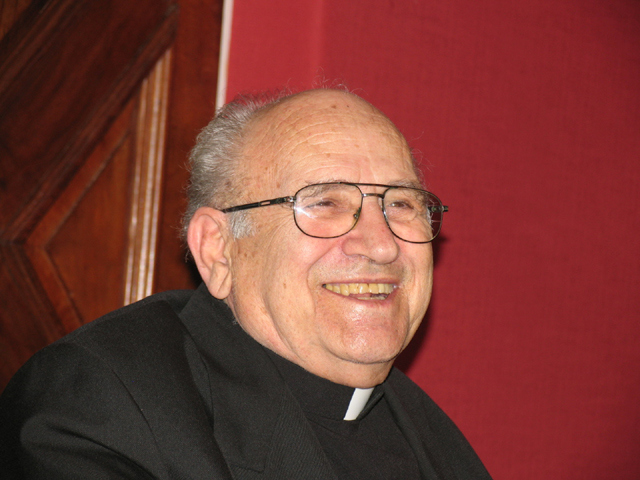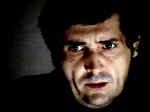 The story goes that as the artist was walking with friends late one afternoon down Oslo's chilly streets, he suddenly stopped, halfway across a bridge, unable to take another step. His companions hardly noticed him lagging behind. Munch describes what happened next.
The story goes that as the artist was walking with friends late one afternoon down Oslo's chilly streets, he suddenly stopped, halfway across a bridge, unable to take another step. His companions hardly noticed him lagging behind. Munch describes what happened next."I was walking along a path with two friends – the sun was setting – suddenly the sky turned blood red – I paused, feeling exhausted, and leaned on the fence – there was blood and tongues of fire above the blue-black fjord and the city – my friends walked on, and I stood there trembling with anxiety – and I sensed an infinite scream passing through nature."
Historians claim that his panic attack/epiphany took place in 1883. The skies were a lurid blood red because of the volumes of volcanic ash launched into the stratosphere by Krakatoa. Ten years later, Munch depicted this and other expressions of the anxiety that filled his life on canvas.
Some of his other paintings - Anxiety, Despair, portrait of Nietzsche - also have the bridge as the location for his subject. The man on the bridge: caught between the past and the future, his beginning and his end. Suspended between the sky above and the depths below.
You gotta love it. A fabulous gift idea for that special someone. Emphasis on 'special'.
Have you heard the scream? Has anyone not heard it? It is especially piercing and sustained in our troubled times. Perhaps that's why this work is so universally appealing.
That, and the artist's cool last name.
E. Munch is definitely up there with the other greats. Tedy Bruschi. Coco Crisp. Kevin Mench.
But I digress.
 Tiger continues to amaze, bringing excitement and diversity to a sport that the Exorcist long thought was only for retired white guys.
Tiger continues to amaze, bringing excitement and diversity to a sport that the Exorcist long thought was only for retired white guys. I know it's barely been 24 hours, but I miss
I know it's barely been 24 hours, but I miss  A Sudanese child slowly making her way to a UN relief camp at the height of the famine. The girl, skin and bones, is being stalked by a vulture, patiently pursuing its next meal. No one knows what became of the child. The picture would suggest that her fate was not a dignified one...
A Sudanese child slowly making her way to a UN relief camp at the height of the famine. The girl, skin and bones, is being stalked by a vulture, patiently pursuing its next meal. No one knows what became of the child. The picture would suggest that her fate was not a dignified one... All human need, therefore, in Christ's mind is a reflection of man's true origin and nature. The need for rest when we are tired, the need for medicine when we are sick, the need for friendship when we are lonely, the need for freedom when we are constrained, the need for food and drink when we are hungry and thirsty... all our deepest needs have their origin and their raison d'etre in our radical dependence on the source of our being.
All human need, therefore, in Christ's mind is a reflection of man's true origin and nature. The need for rest when we are tired, the need for medicine when we are sick, the need for friendship when we are lonely, the need for freedom when we are constrained, the need for food and drink when we are hungry and thirsty... all our deepest needs have their origin and their raison d'etre in our radical dependence on the source of our being. Recuerde el alma dormida,
Recuerde el alma dormida, Christian belief is predicated on the premise that something truly new happened. 'New' meaning absolutely without precedent, unforseen and unforseeable, radically and permanently surprising. No external point of reference. Unrepeatable and, therefore, outside the scope of our science.
Christian belief is predicated on the premise that something truly new happened. 'New' meaning absolutely without precedent, unforseen and unforseeable, radically and permanently surprising. No external point of reference. Unrepeatable and, therefore, outside the scope of our science. Since the new outbreak of hostilities between Israelis and Hezbollah fighters, Pope Benedict has called for
Since the new outbreak of hostilities between Israelis and Hezbollah fighters, Pope Benedict has called for  That said, those called upon to explain the Church's stance or the Pope's statements in the media should refer constantly to the fundamental mission: to speak the truth of Christ even when it falls on deaf ears.
That said, those called upon to explain the Church's stance or the Pope's statements in the media should refer constantly to the fundamental mission: to speak the truth of Christ even when it falls on deaf ears. 
 The story goes that as the artist was walking with friends late one afternoon down Oslo's chilly streets, he suddenly stopped, halfway across a bridge, unable to take another step. His companions hardly noticed him lagging behind.
The story goes that as the artist was walking with friends late one afternoon down Oslo's chilly streets, he suddenly stopped, halfway across a bridge, unable to take another step. His companions hardly noticed him lagging behind. 
